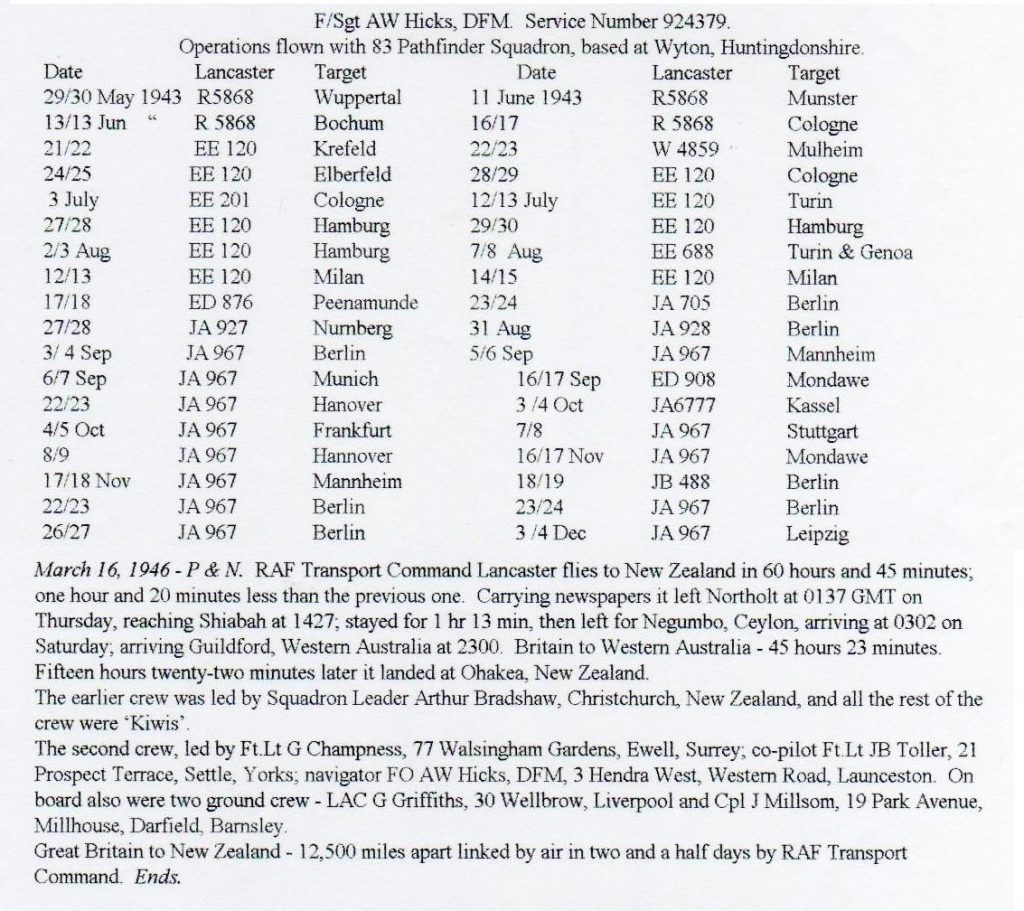.
Alfred was born in the October of 1911 to Alfred (d.1925) and Ellen (nee Hoskin) Hicks at Launceston. His father was the chauffer to Launceston auctioneer, Horace Kittow. Alfred was a business manager employed by coal merchants T. Symons & Co. He enlisted in the RAF (service no. 924379) in 1940 and after training became a Fitter II E, probably specialising on Rolls Royce Merlin engines. RAF records give few details of Ground Crew postings, but it is believed that he became a Fitter II E with 83 Squadron based at R.A.F. Wyton, Huntingdonshire. In late 1942 with the rapidly increasing number of 4-engined heavies – Halifaxes, Lancasters, and Stirlings – the RAF replaced Second Pilots with a new category of Flight Engineers. It was necessary to quickly train up volunteer ground crew engineers already having the technical knowledge of aircraft, and at the time the training was carried out by the squadrons to ensure Flight Engineers were available as new 4-engined aircraft arrived at the squadrons. He flew on some of the most dangerous and difficult operations of the war. In fact, during the period May to December 1943, 83 Squadron lost, as crashed on return from operations 20 Lancasters resulting in 132 aircrew killed and 6 becoming prisoners of war. He flew all his operations with the same crew, who apart from the Wireless Operator, were all decorated.
They were :- Pilot – Flight Lieutenant M. E. Chick, DFC and Bar.
Flight Engineer – Flight Sergeant A. W. Hicks, DFM. Navigator – Flight Sergeant J. W. Slaughter, DFM.
Bomb Aimer – Flying Officer J. Blakeman, DFC. Wireless Operator – Sgt F. Turner.
Mid-Upper Gunner – Flight Sergeant Howell, DFM. Rear Gunner – Flight Sergeant A. Elwood, DFC.
A Bomb-Aimer in a Pathfinder Squadron assisted the Navigator in operating the specialised radar equipment essential for accurate target marking.
In January, 1944 Alfred was awarded the Distinguished Flying Medal. The official citation read: “Flt Sgt has operated over many of the major targets in enemy territory. On all occasions Flt Sgt Hicks has displayed coolness and courage, which have earned high praise from his Captain. His technical skill is exceptional, and has frequently proved a valuable aid when his aircraft has been heavily engaged by the ground defences.”
On completion of the operational tour Alfred Hicks became an Instructor at No 5 Lancaster Finishing School where crews received their conversion training on Lancasters before joining a squadron.

Alfred went on after the war to live in Warwickshire where he died in 1976.
Visits: 267
